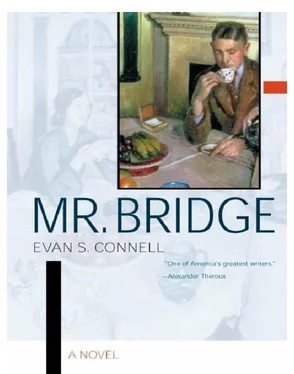Finally he could not avoid this chore any longer. He set an hour for it and when the hour came he walked into the study, shut the door, flattened Houyhnhnm on his desk, and began to study the table of contents with a dissatisfied expression. The first article was some sort of critical appraisal of a Brazilian poet. The second was a satire on Hollywood movies. Next was an interview with a former convict. Since poetry was out of the question and he already had seen the pictures there was nothing to do but look at the stories. They sounded unpromising. The first was titled “Zoo,” next was “Pipeful of Dreams,” which presumably was about narcotics, and the last, set entirely in lower-case without any punctuation, did not have a title. He considered throwing Houyhnhnm in the wastebasket. But he had promised Ruth he would read some of it, so there was no way out. He contemplated the authors on the back cover. The author of “Zoo” was a boy supposedly named Herman Hermann, who had wild eyes and a straggling beard which gave him a singular resemblance to a goat. He was so unusually repellent that Mr. Bridge decided to find out what he had written. He crossed his legs, leaned back in the swivel chair, and began.
The story consisted of a description of the houses and citizens of Sheridan Square. After finishing it he considered whether he had read enough or whether he was obligated to try something else. In another three months he was going to receive a second issue and ought to read at least one piece in that, and two further issues would follow before the year of purgatory ended. So he placed Houyhnhnm high on the bookcase where he would not come across it again by accident, and, very much relieved, went downstairs to the kitchen to fix himself a drink. Mrs. Bridge was in the kitchen preparing dinner because it was Harriet’s night out.
“Where is Douglas?” he asked.
“He went tootling off somewhere. His friends came by and he couldn’t resist. He did promise to be home by nine thirty.”
“And where is our daughter?”
“Still at the club. She phoned a little while ago. She should be here any minute.”
“This family is flying off in all directions,” he said, and sat down at the kitchen table with a drink in his hand. “Well, I tried to read that magazine.”
She was peering into the oven at the roast. “You did what?”
He repeated what he had said, gave a summary of the story, and went on: “What I don’t understand is why in the name of all that’s holy these young people can’t write about anything except the gutter.”
Mrs. Bridge was opening a can of succotash.
“This young fellow goes on and on about torn window shades, drunks, prostitutes, and I don’t know what-all. A little bit of that goes a long way, but he just wouldn’t let up. He insists on rubbing your nose in it. I thought the darn story was never going to end.”
“Well, I suppose,” she murmured, and slid a pan of rolls into the oven.
“Kids today say ‘That’s life!’ but I tell you there’s more to life than the sort of existence people lead in Greenwich Village. I don’t mind saying I’ve seen enough of life to know a bit about it. Years ago when I was a young man I lived in a slum district and I didn’t like it and certainly never was foolish enough to consider it romantic, and I never want to go back to it. But these young people nowadays sound as though they’re attracted to the trash cans and every other sort of filth they can find. I don’t understand what they’re up to. Frankly, I was tempted to hand the thing over to Alex Sauer to see what he could make of it.”
“Oh!” she said, and stopped work. “Guess what. Madge called this afternoon. Dr. Sauer and Genevieve are getting married. I was simply floored.”
“More power to them,” he said, lifting his drink. “For a wedding present I just might send them a year’s subscription. I suspect it would be right up their alley.”
“Now, that’s not very nice,” she said.
A few minutes later Carolyn came home, and he asked what she had been doing all day. As usual she had been playing golf. Most of her summer was being spent on the Mission course. It was a waste of time, he thought, but at least she was not mixed up with a Greenwich Village crowd.
101 Billy Jack Andrews, Pro
Billy Jack was the golf professional at Mission Country Club. He had been there as long as anybody could remember, he was at least sixty-five years old, and only children called him Mr. Andrews. The day was not far off when Billy Jack would retire. That was what people said. But they had been saying it since he was fifty, and now, seeing him on the course, it appeared he would still be the pro when he was eighty. He had taught Carolyn how to hold the clubs when she was eleven, but after her first few lessons he quit being a genial instructor and became a relentless coach. A year later he insisted she begin playing in the annual tournament. He told Mrs. Bridge that Carolyn could become a champion, which naturally was reported to Mr. Bridge. Both of them were bemused and waited to see what would happen.
Unfortunately, Billy Jack told Carolyn the same thing, no doubt to encourage her and give her the confidence to play against older girls. Carolyn’s game improved much faster as a result of this compliment, but after a while she began talking as though it was his fault she had not yet won the championship. He took these remarks with good humor and continued to coach her, but his grandfatherly affection was cooling.
Then one day after she had played the course against the Mission women’s champion, losing by two strokes, they were walking up the path toward the clubhouse, followed by their caddies, when they met Billy Jack on his way out with another student. He stopped to inquire about the game and he congratulated Carolyn for having played so well. She replied that if he had not instructed her to use a six-iron across the water hazard on the fourteenth hole she would have tied the match.
Billy Jack told Carolyn she was insufferable. He told her she had not paid any attention to his advice about the water hazard and he informed her that in general she had a great deal yet to learn about the game, as well as about common courtesy. In his years at Mission he had encountered plenty of temperamental golfers. He did not intend to be pushed around by this one.
Carolyn was too astounded to speak. Nobody had ever spoken to her like that, so she did not know how to react; she glowered helplessly as Billy Jack and his student walked on down the path to the course.
But as the minutes and the hours went by she began to know how she felt; what she wanted more than anything on earth was to have Billy Jack fired. She wanted the head of Billy Jack Andrews on a platter. His flayed skin she would nail to the wall just as her brother once wanted to nail a squirrel to the wall, and his reputation she would grind into the dust. And because she did not have the power to accomplish this she went to her father, who had been a member of the club for a long time, who had paid dues for years, who surely would be in a position to destroy the pro. She argued her case and waited, confident that he would rise up in a rage. But for some reason he did not. She was puzzled because he appeared to be thinking it over.
Mr. Bridge was acquainted with the pro. Years before, he had taken a few lessons with the idea of getting some exercise, but a round of golf used up half the day — which seemed wasteful — so he had quit. Since then he had run into Billy Jack now and then at the club, and the pro remembered him, which was a bit flattering. Mr. Bridge liked Billy Jack.
Carolyn tried every device she had used on her father in the past. Nothing worked. He told her that even if her resentment was justifiable, which he doubted, he did not think that a single incident was sufficient cause to demand that the pro be dismissed. He inquired if other golfers were complaining about Billy Jack. Carolyn replied that everybody was complaining; but as soon as she had said this she realized her father would ask for the names of people who had complained and he would call them up, so she went on quickly: “Don’t you care if an employee of the club insults me?”
Читать дальше












